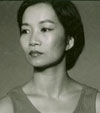 Wang will lead a group consisting of 20 computer programmers, 10 artists, 10 dance students and five administrators who will decode human movement and systemize it into a computer software program that can be used by:
Wang will lead a group consisting of 20 computer programmers, 10 artists, 10 dance students and five administrators who will decode human movement and systemize it into a computer software program that can be used by: For Immediate Release
Contacts:
Jane Turnis
(719) 389-6138
JTurnis@ColoradoCollege.edu
COLORADO SPRINGS, Colo. – Dec. 21, 2005 – Yunyu Wang, professor of dance at Colorado College, has been awarded a $1.5 million grant from Taiwan’s Ministry of Economic Affairs to lead a software development project using Laban Movement Analysis.
 Wang will lead a group consisting of 20 computer programmers, 10 artists, 10 dance students and five administrators who will decode human movement and systemize it into a computer software program that can be used by:
Wang will lead a group consisting of 20 computer programmers, 10 artists, 10 dance students and five administrators who will decode human movement and systemize it into a computer software program that can be used by:
- animators in creating characters actions that are more realistic.
- rehabilitation and fitness therapists.
- choreographers and other performing arts workers to analyze and consider all possible human movements.
The grant funds a project that will span three years. The resulting software will be the first of its kind.
Laban Movement Analysis is a system and language devised by European dancer and dance theorist Rudolf Laban for observing, describing and notating all forms of movement. LMA is one of the most widely used systems of human movement analysis, using Laban’s theories of effort and shape to describe, interpret and document human movement. LMA is used by dancers, athletes, animators and occupational therapists.
Wang said the Taiwan Ministry of Economic Affairs requested grant proposals for projects that require collaboration between academic and creative arts research, and that would result in real-world applications with economic potential. The software will be marketed worldwide.
Wang has been certified in Laban Movement Analysis since 1996. She applies the theory in her teaching at Colorado College in classes such as Beginning Choreography Form and Movement Analysis. She is also certified in Labanotation, Rudolf Laban’s dance notation system, and uses that tool in dance reconstruction at CC.
At the annual faculty dance concert at Colorado College in March 2006, Wang plans to use Labanotation in the reconstruction of a 1912 "antique" dance, Vaslav Nijinsky's "Prelude to the Afternoon of a Faun." Nijinsky's daughter, Tamara Nijinsky, and granddaughter, Kinga Nijinsky Gaspers, plan to attend the event.
Ann Hutchinson Guest, Director of the Language of Dance Center in London, the leading world center for reconstruction of historic dance pieces, will advise and consult with Wang on the reconstruction, and also will certify its authenticity. Guest, an acknowledged world authority on dance notation, consults with renowned dance companies throughout the world, assuring historical accuracy.
Wang and the project team will present their discoveries from the software development project at a conference for performing arts, animation and rehabilitation therapy workers at Colorado College in 2007.
Tom Lindblade, chair of Colorado College’s drama and dance department, said Wang’s work broadens the discipline of dance to a wider scope.
“This is the leading edge of dance technology,” he said. “Motion capture melds physiology and technology, and is creative as well as practical and aesthetic. It’s very difficult to deal with a human being in technology, and this is a matter of bridging that gap. It will have applications across the board.”
Wang expects the project will benefit CC students as well.
“It is important to me that I continue to advance myself and hopefully lead the field,” she said. In addition, “I can share with my students how wide the field is. It is not just dance on stage, but more and beyond.”
Wang, who was born in Taiwan, came to the United States in 1981 as a student, and has remained as a professor. In 1989-90, she chaired the dance department at Taipei National University of the Arts, and continues to work as a visiting professor there. Wang teaches Chinese Meditative Arts at Taipei National University of the Arts to CC students who study abroad in Asia. TNUA also hosts a biology program in Taiwan for Colorado College students.
About Colorado College
Colorado College is a nationally prominent, four-year liberal arts and sciences college that was founded in Colorado Springs in 1874. The college operates on the innovative Block Plan, in which its 1,950 students study one course at a time in intensive 3½-week blocks. For more information, visit www.ColoradoCollege.edu <http://www.ColoradoCollege.edu>.
EDITOR’S NOTE: A photo of Wang is available upon request.